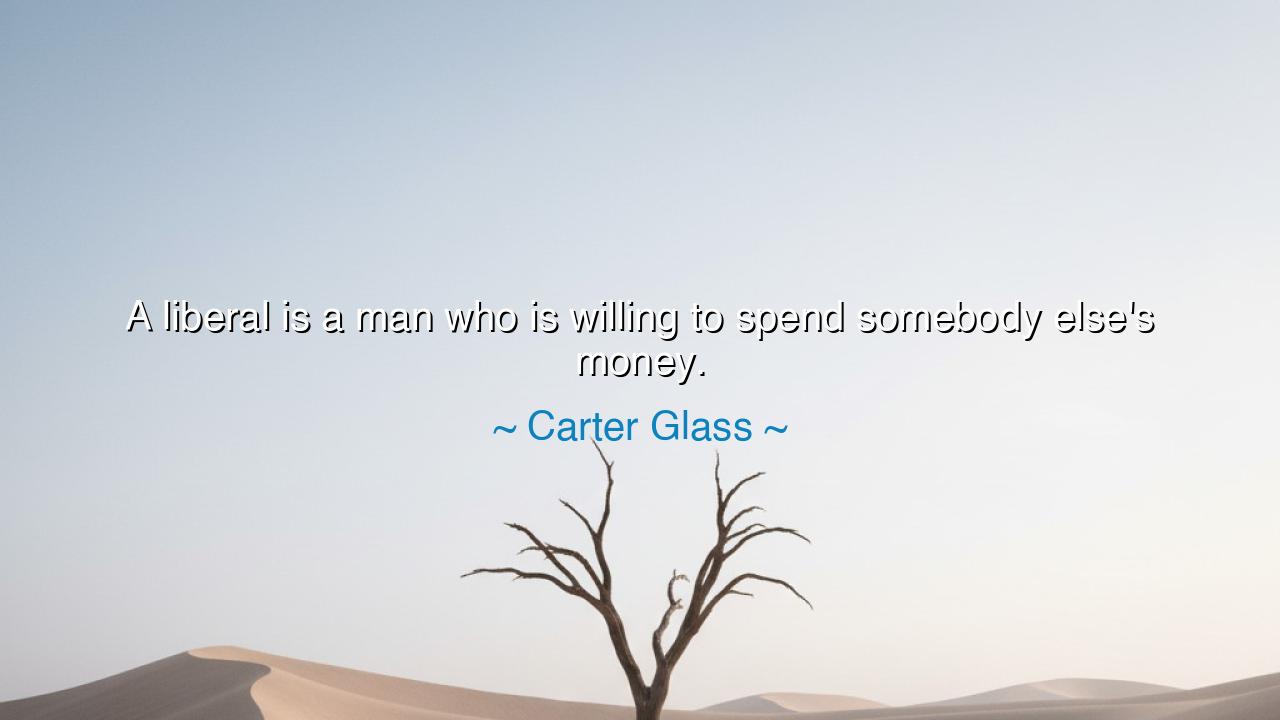
A liberal is a man who is willing to spend somebody else's






The words of Carter Glass, banker, statesman, and architect of American finance, strike with biting wit: “A liberal is a man who is willing to spend somebody else’s money.” In this saying, he reduces the great struggles of political philosophy to a sharp and memorable line. To Glass, the heart of liberalism was not frugality or self-denial, but the readiness to use the resources of the many for the causes of the few. Whether meant as jest or accusation, his words expose the tension at the heart of governance: who bears the cost of justice, reform, and progress?
The ancients too wrestled with this question. In Athens, the wealthy were compelled to fund festivals, ships, and civic works, often against their will. To the rich, this felt like robbery masked as virtue; to the poor, it was the rightful price of privilege. Thus the cry of “spending another’s wealth” was heard even then, as elites grumbled that democracy drained their fortunes while elevating the common man. Glass’s words are the modern echo of this ancient quarrel between generosity and resentment.
His career gives weight to the quote. As a principal author of the Federal Reserve Act and the Glass-Steagall Act, Glass believed deeply in fiscal order and discipline. To him, public funds were not an infinite fountain but a fragile trust. His quip about liberals was less about charity itself than about recklessness—about the temptation of politicians to buy popularity with promises financed not from their own pockets, but from the pockets of unseen taxpayers.
History provides many examples of this danger. In the waning days of the Roman Empire, emperors lavished grain and games upon the people, emptying treasuries while neglecting the strength of the legions. They spent “somebody else’s money”—the wealth of provinces, the labor of future generations—until the empire collapsed beneath its own debts. In this sense, Glass’s wisdom is not merely partisan wit, but a warning across time: that spending without restraint, when disconnected from responsibility, leads to ruin.
Let the generations remember: the power to tax and to spend is the most dangerous weapon of the state. To spend wisely is to secure the future; to spend carelessly is to mortgage it. Whether one is liberal or conservative, the test of leadership lies in remembering that public wealth is not one’s own purse, but the hard-won fruit of the people’s labor. Carter Glass’s sharp words endure as both criticism and caution—that generosity without responsibility is not justice, but folly cloaked in noble phrases.






Llakimphung
How much does the portrayal of liberals as 'spending other people's money' simplify the broader debates over taxation, social programs, and economic policy? Could this quote reflect a common frustration among conservatives with what they see as irresponsible spending, or is it a broader critique of governmental overreach? How can we have a more nuanced discussion of fiscal policy without resorting to such polarized language?
Ddhphuongg
Is this an attack on the idea of government spending for social programs, or a deeper critique of how spending decisions are made? While this quote suggests that liberals are overly willing to spend others’ money, does it also overlook the philosophical underpinning that some believe in greater collective responsibility for the welfare of society? Should we view this as a criticism of the mechanisms of government rather than the intent?
PKThuy Phuong Khong
What does this quote say about the clash between conservative and liberal views on government spending? Is it fair to label liberals as 'spending other people's money' when much of their agenda is designed to address income inequality and social justice? Could it be that the difference lies in how each group defines 'fairness' and 'equality' in society?
H0Vo Nguyen Gia Han 07-7B-
Could Carter Glass be critiquing the perceived lack of responsibility that comes with spending other people’s money? Is it fair to say that liberals only push for spending without fully considering the consequences? How much of the liberal agenda focuses on wealth redistribution to benefit society versus the potential unintended consequences of such policies? Should there be more focus on accountability in government spending?
MTNguyen Huynh Minh Thy
Is this a fair characterization of liberals, or is it an oversimplification of political ideology? While it's true that liberal policies often involve redistribution of wealth, does this quote reduce the complexity of their arguments to a simple stereotype? Shouldn't we explore whether these policies are designed to create a more equitable society, not just to spend other people’s money?